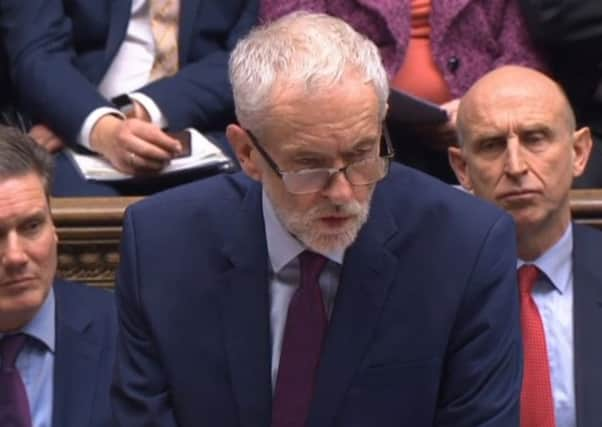Mark Stuart: Is Corbyn ready to emulate Wilson over a referendum?


In many respects, it’s easier to be in Opposition rather than in Government. Internal party splits can be massaged, as the media focuses its attention on the travails of the party in power.
For over two years, Corbyn’s strategy over Brexit has been one of ‘constructive ambiguity’, playing a waiting game, hoping that the Conservative Party will tear itself apart.
Advertisement
Hide AdAdvertisement
Hide AdOne can see his reasoning: why should he waste any political capital in helping out his hated opponents? And in some senses, this strategy has worked quite well up until now. In the words of BBC Radio Four’s Today programme presenter, Nick Robinson, the Conservatives have turned into ‘a circular firing squad’.


But Corbyn has been slow to call a vote of no confidence in Theresa May’s Government, despite the call by SNP leader, Nicola Sturgeon, to topple this ‘shambles Government’.
Corbyn will not go down that route yet, knowing full well that the Democratic Unionists will not want to let him into power unless they are certain that Theresa May cannot deliver an EU climbdown on the so-called Northern Irish ‘backstop’ arrangement. Besides, no sane Conservative MP would risk the prospect of Corbyn taking up residence in Number 10 Downing Street as Prime Minister.
The suspicion remains that both frontbenches – Conservative and Labour – are intent on letting the clock tick down to exit day on March 29 next year; the Prime Minister in the vain hope that Parliament will be forced to agree to her deal, but also Jeremy Corbyn in the hope that Brexit will still go ahead.
Advertisement
Hide AdAdvertisement
Hide AdIn his heart of hearts, Jeremy Corbyn has always been hostile towards the European Union. As a private citizen, he voted against staying in the European Economic Community in the 1975 referendum, and his lack of enthusiasm for the ‘Labour In’ campaign during the 2016 referendum led his own MPs to deliver a vote of no confidence in him by 172 votes to 40, a far worse result than Theresa May suffered on Wednesday night.
In reality, the splits among Labour MPs over Europe are just as acute as those among their Conservative counterparts. While lots of Labour MPs represent seats in the North of England, including here in Yorkshire that voted heavily to leave the EU, Corbyn must also consider his new power base in London, which voted heavily to Remain.
Pressure is steadily building in the Parliamentary Labour Party for a second referendum. Until now, the Shadow Brexit Secretary, Sir Keir Starmer, has played a blinder in edging the Labour leadership slowly but surely in a more pro-European direction. Last summer, Labour finally committed itself to supporting some sort of customs union with the EU. And then the party refused to rule out any option at its annual conference, including the possibility of supporting a so-called ‘People’s Vote’.
One cannot help thinking back to what Harold Wilson did in 1974-1975. Having previously been pro-European in Government from 1964 to 1970, Wilson flip-flopped in Opposition from 1970 to 1974 to keep his fractious party afloat. And then when he returned to Government in 1974, he flip-flopped again, this time realising that he could bring all the competing views together by calling a referendum on Britain’s membership of the EEC.
Advertisement
Hide AdAdvertisement
Hide AdWilson was the master manipulator, as observed by Bernard Donoghue, his chief advisor in Downing Street in his published diaries. It helped that Wilson was agnostic on the issue of Europe. It allowed him to keep everyone on board until the last possible moment until he finally agreed to holding the referendum. And it is worth recalling that he was able to do so without a single Cabinet resignation, a remarkable feat if we look at the carnage of resignations both parties have suffered over Brexit in the last two-and-a-half years.
One thing is certain. Jeremy Corbyn is no Harold Wilson. Besides, there are very real dangers in Labour coming out in favour of a People’s Vote. For a start, many of the trade union leaders share Corbyn’s Euroscepticism. And more importantly, the Leader of the Opposition risks peeling off Labour MPs in Leave seats in the North who might be tempted to back Theresa May’s Brexit deal.
But the reality is that whatever the House of Commons decides to do in the coming months, some form of cross-party agreement must be reached.
I understand that there are at least eight Remain Conservative MPs prepared to join with the other Opposition parties in support of a second referendum.
Advertisement
Hide AdAdvertisement
Hide AdWere they to be joined by the likes of Jo Johnson, who recently resigned from the Government, then a majority might be found for this option.
The question everyone is asking is will Jeremy Corbyn be willing to ‘do a Wilson’ and make such an outcome happen?
Mark Stuart is a political academic from York who has written the biographies of John Smith and Douglas Hurd.